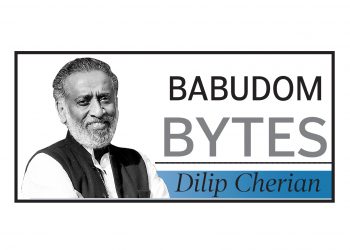If your password is still “1234” and you think a luxury hotel room is a safe space, you’re probably not ready for the digital age, let alone high office.
It’s hard to decide what’s more staggering, the number of people allegedly trapped, or the sheer ease with which it apparently happened. At least 72 public figures, including IAS and IPS officers, as well as ministers, reportedly walked into hotel rooms, seduced by charm, only to discover (later, presumably) that hidden cameras had been recording their own events.
The women, we’re told, were young and attractive. The hotels were well-furnished with surveillance. And the outcome? Blackmail, attempted suicide, hushed panic. Some officers are believed to have paid up to ₹3 crore to keep things quiet, although now, with the arrest of a woman from Thane and murmurs reaching the Chief Minister’s and Opposition leader’s desks, “quiet” may no longer be an option. CM Devendra Fadnavis and Opposition Leader Nana Patole have broken their silence, but the scandal requires more than soundbites.
This isn’t just about personal conduct. It’s about vulnerability at the highest levels of governance. Officials with access to sensitive information fell prey not just to emotional manipulation, but to basic operational traps. That’s a national security problem, not just a moral one.
What’s also troubling is the lack of transparency. No official has stepped forward. The silence is deafening and dangerous. If public servants can be compromised this easily and still shield themselves behind rank and protocol, who’s to say what else is being quietly buried?
Let’s skip the moral outrage. But it’s high time governments took internal security and digital literacy far more seriously. Not every scandal needs to go viral before someone acts.
Why vacant PSU boardrooms should worry us
For a country chasing trillion-dollar dreams, we seem oddly comfortable running key institutions on half a leadership bench.
Consider PSU banks. There are currently more than 70 board-level openings across 12 public sector lenders, ranging from MDs and Executive Directors to non-official directors. This is a governance gap rather than merely an HR one, and it has practical implications for risk management, credit flow, and strategic decision-making.
The economy, as a whole, suffers when Union Bank of India is without an MD or CEO for more than a month.
It’s not just banks, either. Numerous important leadership positions are open at CPSEs in a variety of industries, including energy (NTPC, IOCL) and infrastructure (SAIL, BHEL, IRCON). Posts have been advertised, search-cum-selection panels have been established, and updated guidelines have been distributed by the Public Enterprises Selection Board. However, it still feels more like a marathon than a relay sprint to go from vacancy to appointment.
This is important since these positions are not symbolic. They are in charge of multi-crore projects, jobs, and vital national resources; they are the fulcrums of India’s growth engines. Execution suffers when top-level leadership is absent or haphazard. And that can result in expensive delays or lost opportunities in industries like mining, power, and defence manufacturing.
The government may well be “in the process.” But it’s time to move from process to outcome. Our PSUs deserve nothing less than a full-strength leadership team.
Chandigarh gets a steady hand at the top
After months of musical chairs in the top police post, Chandigarh has finally secured a full-time DGP.
Moreover, it’s not just any officer, but one with both local roots and a global résumé.
Sagar Preet Hooda, a 1997-batch IPS officer of the AGMUT cadre, steps into the role at a time when Chandigarh Police could use more than just a steady hand. With recent turbulence in the force, including an SIT probe into an alleged assault involving Punjab Police personnel, Hooda’s arrival brings much-needed leadership clarity. He could provide a much-needed fresh start.
What makes this appointment stand out isn’t just the end of a long vacancy, but the calibre of the officer.
A Harvard Edward S. Mason Fellow, with stints at Duke and LSE, and a sociology PhD from Panjab University, Hooda represents that rare mix of field experience and academic grounding. Currently helming Delhi Police’s Intelligence Division, he’s no stranger to high-pressure portfolios.
The hope now is that Hooda’s Chandigarh connection and policy acumen will translate into better institutional morale, sharper policing, and more responsive leadership. After all, Chandigarh, with its unique UT governance structure and inter-state sensitivities, isn’t the easiest beat.
Acting DGPs may keep the ship afloat, but real leadership is about course correction and long-term vision.
Hooda’s appointment may well mark a turning point—provided he gets the autonomy and time to lead from the front.
By Dilip Cherian
